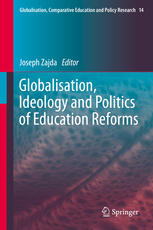

Most ebook files are in PDF format, so you can easily read them using various software such as Foxit Reader or directly on the Google Chrome browser.
Some ebook files are released by publishers in other formats such as .awz, .mobi, .epub, .fb2, etc. You may need to install specific software to read these formats on mobile/PC, such as Calibre.
Please read the tutorial at this link: https://ebookbell.com/faq
We offer FREE conversion to the popular formats you request; however, this may take some time. Therefore, right after payment, please email us, and we will try to provide the service as quickly as possible.
For some exceptional file formats or broken links (if any), please refrain from opening any disputes. Instead, email us first, and we will try to assist within a maximum of 6 hours.
EbookBell Team

4.1
70 reviewsThis 14th volume in the 24-volume book series sets out to explore the interrelationship between ideology, the state, and education reforms, placing it in a global context. It examines some of the major education reforms and policy issues in a global culture, particularly in the light of recent shifts in accountability, quality and standards-driven education, and policy research. By doing so, it provides a comprehensive picture of the intersecting and diverse discourses of globalisation and policy-driven reforms in education.
The book draws upon recent studies in the areas of globalisation, equality, and the role of the state. It explores conceptual frameworks and methodological approaches applicable in the research covering the state, globalisation, and education reforms. It critiques the neo-liberal ideological imperatives of current education and policy reforms, and illustrates the way that shifts in the relationship between the state and education policy affect current trends in education reforms and schooling globally. Individual chapters critically assess the dominant discourses and debates on education and policy reforms. Using diverse comparative education paradigms from critical theory to historical-comparative research, the chapters focus on globalisation, ideology and democracy and examine both the reasons and outcomes of education reforms and policy change. They provide an informed critique of models of accountability, quality and standards-driven education reforms that are informed by Western dominant ideologies and social values. The book also draws upon recent studies in the areas of equity, cultural capital and dominant ideologies in education.